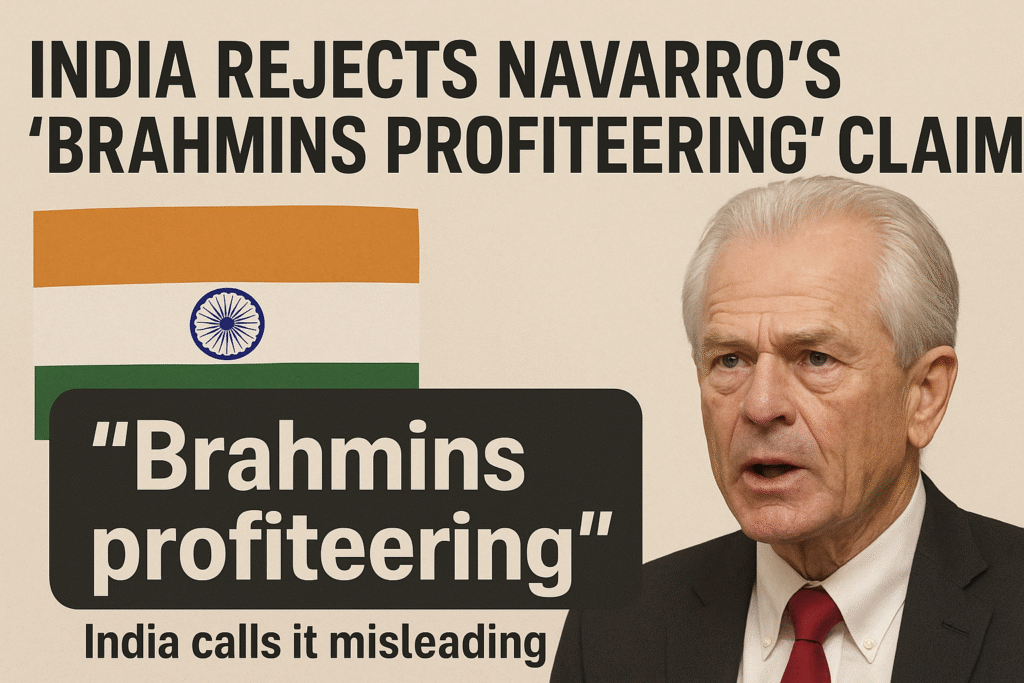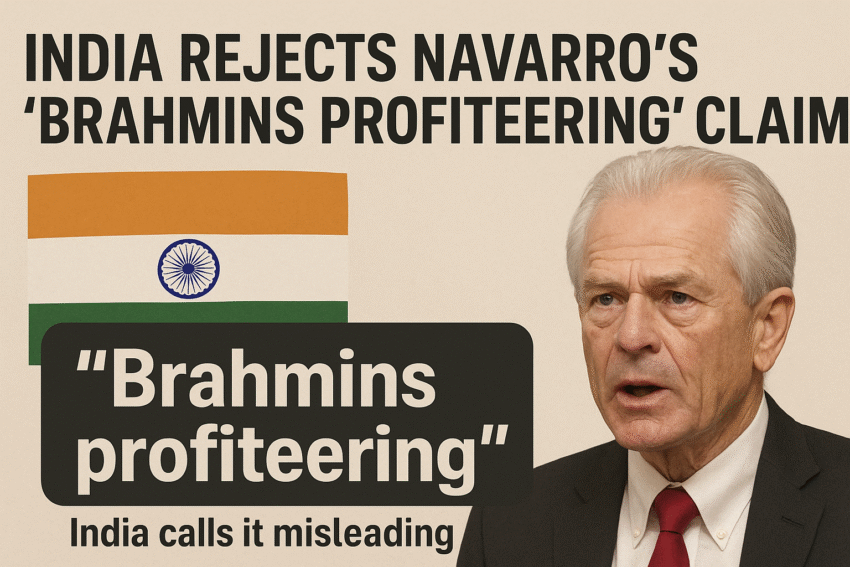
India Rejects ‘Brahmins Profiteering’ Remark by Navarro
In a firm and unequivocal response, the Government of India has rejected the controversial claim by Peter Navarro—former U.S. trade adviser—that “Brahmins profiteering from Russian crude.” This statement was labeled both inaccurate and misleading by India’s Ministry of External Affairs (MEA), signaling a clear stand against what it termed an unhelpful and divisive narrative. The Times of IndiaThe Economic TimesIndia TodayMoneycontrol
Peter Navarro made the contentious statement during a Fox News interview, in the context of defending punitive tariffs—up to 50%—on Indian imports. He accused India of acting as a “laundromat for the Kremlin,” alleging that certain groups were profiting by buying discounted Russian crude, refining it, and exporting at a premium. In his stark language, he said:
“You’ve got Brahmins profiteering at the expense of the Indian people.” The Economic TimesThe Times of IndiaThe Indian Expresswww.ndtv.com
The comment touched a nerve both domestically and internationally, triggering widespread backlash across political and social lines in India.
Indian Response: Diplomatic Rejection
At a press briefing, MEA spokesperson Randhir Jaiswal characterized Navarro’s claims as inaccurate and misleading, stressing that the Indian government firmly rejects such distortions. India TodayMoneycontrolThe Economic TimesThe Daily Jagran
He further reaffirmed the importance of Indo-U.S. ties, citing their foundation in shared democratic values, strategic interests, and strong people-to-people engagement. He noted ongoing cooperation, including a recent 2+2 inter-sessional dialogue and joint military exercises—for instance, in Alaska—to underscore ties anchored in mutual respect. India TodayThe Daily Jagran
Social and Political Backlash
Navarro’s remarks drew condemnation from multiple quarters. Political figures deemed the statement casteist, with opposition leaders arguing that invoking a specific caste—especially in an international context—was deeply problematic.
A significant voice of dissent came from U.S.-based Hindu advocacy group HinduPACT’s affiliate, American Hindus Against Defamation (AHAD). The group demanded Navarro’s removal, calling his comments “Hinduphobic” and “a colonial-era trope” meant to divide Indian society. They argued that using caste identity as scapegoat in geopolitical discourse was a reckless provocation that undermines democracy. The FederalThe Times of India
Moreover, Indian billionaire Harsh Goenka took to social media with a sharp and witty retort:
“Dear Peter Navarro, India’s boardrooms aren’t run by Brahmins. Tata? Not Brahmin. Reliance? Not Brahmin…” Hindustan Times
Over social platforms, the phrase “Brahmins profiteering” became a flashpoint, spawning memes, sarcasm, and sharp mockery from Indian netizens. The Economic Times+2The Economic Times+2The Times of India
Geopolitical Context: Strained Indo-U.S. Relations
Navarro’s comment is emblematic of deeper tensions in the U.S.–India relationship under the Trump-era policies. While figures like Marco Rubio and U.S. Trade Representative Jamieson Greer sought a more conciliatory approach—offering trade deals with reduced Indian tariffs—Navarro’s rhetoric added friction, particularly over India’s energy imports from Russia. The Washington Post
India, for its part, has consistently defended its oil procurement strategy as based on national interest and market considerations, not political alignment.
Why This Matters: Cultural Sensitivities & Diplomacy
Navarro’s use of the term “Brahmins profiteering” overlooked the cultural and historical weight of caste in India. While in the American lexicon phrases like “Boston Brahmins” refer to a once-elite New England aristocracy—predominately white and Protestant The Times of IndiaThe Indian Express—its application to India triggered widespread offense.
Using caste as a geopolitical scapegoat not only oversimplifies complex economic phenomena, but risks alienating a vital bilateral partner—at a time when India–U.S. relations are being shaped by both strategic alignment and trade friction.
What Happens Next?
The MEA’s rejection of Navarro’s remarks—and their determination to keep the diplomatic dialogue moving forward—signals that India is looking beyond this controversy to a longer-term trajectory of mutual engagement.
Yet the episode raises questions about the role of politicized rhetoric in international policy and the importance of cultural awareness in global discourse.

